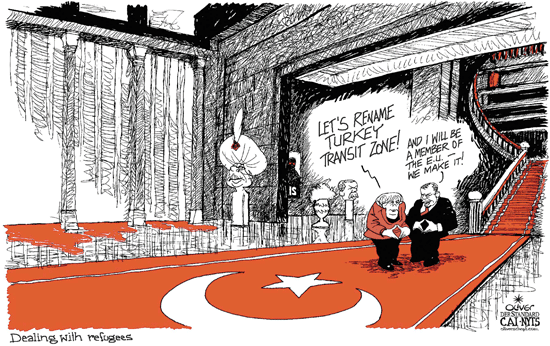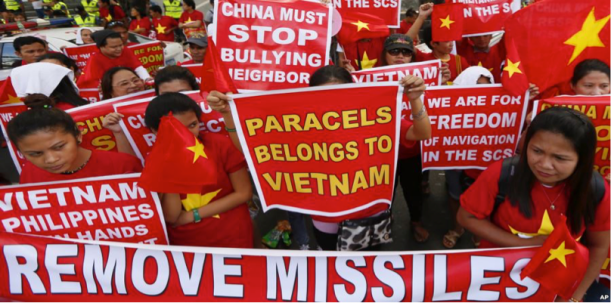Shane Bagwell
On April 15, 2016, German Chancellor Angela Merkel authorized the prosecution of comedian Jan Böhmermann under Article 103 of the German Criminal Code, a lèse-majesté law prohibiting “defamation of organs and representatives of foreign states.”[1] The Article is so rarely used and outdated that many jurists were unaware of its very existence until recently. The case now heads to the German judiciary for potential prosecution, though the outcome is hardly certain to any of the parties involved. The Chancellor’s announcement represents the broader situation in Europe, which is facing a refugee crisis, culture clash resulting from thousands of migrants entering the EU, and dwindling influence outside of its borders.
Lèse-majesté is an ancient concept dating back to the Romans, who made it a criminal offense to injure the sovereign power of the Roman people. The concept has shifted in its use over the years, and now includes certain crimes against the government as well. The current German law dates back to 1871, when Kaiser Wilhelm II expanded the definition to include non-royal heads of state in an effort to secure the country’s ability to conduct diplomatic relations more effectively.
Turkey has been an associate member of the European Union since 1963, has been waiting for membership since 1987. However, numerous concerns about issues ranging from human rights to free speech have blocked their accession in one way or another. Since the outbreak of the Syrian Civil War though, Turkish influence over Europe has increased dramatically. A recent agreement between the EU and Turkey provides for more asylum seekers to remain in Turkey in exchange for EU cash assistance and other concessions (including renewed talks of Turkish accession).

As Europe has grown ever more reliant of Turkey and President Erdoğan for support during the refugee crisis, the Turkish government’s sway over Brussels (and Berlin) has grown drastically. Although Germany was previously one of the leading and most vocal critics of Turkish accession to the EU, Chancellor Merkel’s government has aggressively sought a warming of relations, some would say to the detriment of her own country’s power and prestige. And, with recent German municipal elections strongly favoring a fresh tide of right-wing, anti-immigrant sentiments, she has reason to worry. Not only does the crisis have the power to potentially bring down her government, it could well lead to a collapse of the Union itself. As countries within the Schengen area have closed their borders to prevent the flow of asylum seekers, the cracks within Europe are beginning to show.
Within the last several months, Turkey has arrested scores of journalists and academics critical of the regime. Two journalists from the Turkist newspaper Cumhuriyet were tried for espionage after publishing a video that allegedly showed Turkey’s intelligence agency funneling weapons into Syria.[2] In March, two cartoonists were sentenced to 11 months and 20 days in prison for insulting Erdoğan on the cover of Penguen magazine, on which a cartoon figure of Erdogan is welcomed to the presidential palace by a public servant. Erdoğan tells him, “But this is so dry. We could have at least slaughtered a journalist.”[3] (A prime example of the President’s penchant for irony) The crackdown on journalists and academics syncs up with the Turkish government’s crackdown on Kurds in the southeast of the country, which has been subject to a media blackout, and has been harshly criticized by the free press group Reporters without Borders, whose Turkey page provides a truly damming assessment of free speech within Turkey. [4]

Unable to resist the temptation of lampooning Turkey’s President over his increasingly dictatorial approach to governance, German comedian Jan Böhmermann released a video entitled “Erdowie, Erdowo, Erdoğan.”[5] The video shows footage of Erdogan’s most absurd public moments, intercut with crackdowns on protesters. “Equal rights for women: beaten up equally,” the song goes, as police beat women with batons.[6] Shortly after the video was aired on German television, the German ambassador in Ankara was summoned before the Turkish government to answer for the affront.[7] Within days, Böhmermann was at it again, this time specifically to test the limits of the free speech laws in Germany. The German ambassador was summoned once again, but this time rather than a verbal lashing, it was to receive a formal complaint that was required for prosecution under Article 103. Chancellor Merkel was faced with a tough decision: support the free speech rights of the Germans (indeed all of Europe), but risk the deal that had been hard worked between the EU and Turkey, or bow to Turkish pressure and cede German prestige and power to assure the agreement’s future. Unfortunately, Chancellor Merkel failed to remember that petulant and brutish tyrants such as Erdoğan will only be emboldened by concessions, a lesson which the rest of the world learned dealing with Germany in the 1930’s.

Erdoğan’s response to Böhmermann has been to say, “I’m not some sort of tyrannical leader that is hostile to a free press, and to show it, I’m going to request that a foreign government prosecute a comedian for making fun of me.” The inability to recognize the irony of the situation only stands to bolster the argument that Erdoğan might need a lesson in what a “sense of humor is.” Free speech advocates around the world have lined up behind Böhmermann, not because his crass and offensive poem itself was valuable to the public discourse, but because art sometimes requires a shock to the senses in order to stimulate the discussion which this affair has.[8] The authorization for prosecution by Chancellor Merkel represents Germany’s bowing to the power of the new Ottoman Empire, and an abandonment of the core values which Europe seeks to protect. Perhaps the greatest joke here is that concerns such as these have been the largest impediment to Turkey’s accession to the Union. Now we wait to see who has the last laugh.
Shane Bagwell is a 3L at the University of Baltimore School of Law, and a graduate of West Chester University with a Bachelor of Arts in Political Science. He currently serves as the President of the Military Law Association. His interests are Middle Eastern politics, international conflicts, and the law of land warfare. He is currently a law clerk for the Office of the State’s Attorney for Baltimore City, Economic Crimes Division.
[1]Strafgesetzbuch (StGB) (Penal Code) § 103
[2]‘I’m not at war with press,’ says Turkish President Recep Tayyip Erdogan, CNN, 31 March 2016, http://www.cnn.com/2016/03/31/middleeast/recep-tayyip-erdogan-amanpour-interview/ (last visited 17 April 2016)
[3]Cartoonists convicted for insulting Turkey’s President, Zeynep Bilginsoy and Ivan Watson, CNN, 26 March 2016, http://www.cnn.com/2015/03/26/world/turkey-cartoonists-conviction/ (last visited 17 April 2016)
[4]Reporers Without Borders, Turkey, https://rsf.org/en/turkey (last visited 17 April 2016)
[5]https://www.youtube.com/watch?v=R2e2yHjc_mc
[6]Erdowie Erdowo Erdogan The Video That Made Turkey Mad Enough to Summon the German Ambassador, Foreign Policy Watch, http://foreignpolicy.com/2016/03/29/watch-erdowie-erdowo-erdogan-the-video-that-made-turkey-mad-enough-to-summon-the-german-ambassador/ (last visited 4/15/2016).
[7]Turkey asks Germany to prosecute comedian over Erdoğan poem, The Guardian, 11 April 2016, http://www.theguardian.com/world/2016/apr/11/turkey-germany-prosecute-comedian-jan-bohmermann-erdogan-poem (last visited 17 April 2016)
[8]Künstler solidarisieren sich mit Böhmermann, Die Zeit, 13 April 2016, http://www.zeit.de/kultur/film/2016-04/jan-boehmermann-satire-solidaritaet-prominente-offener-brief (last accessed 17 April 2016) (auf Deutsch) (in German)




















